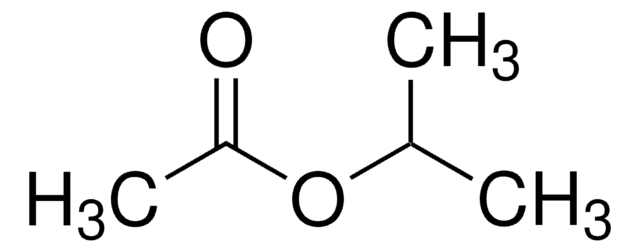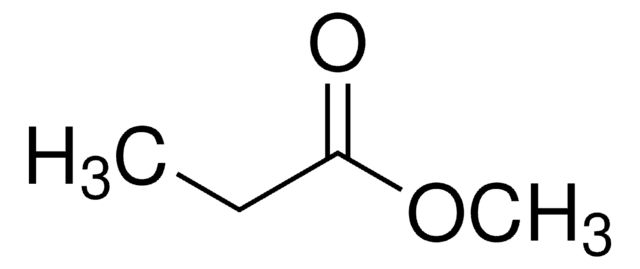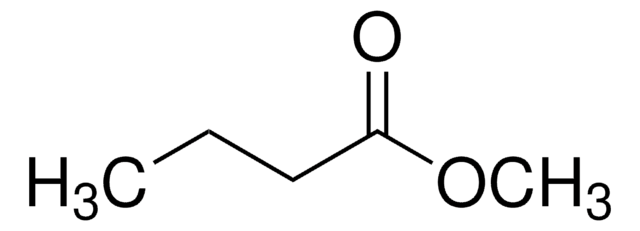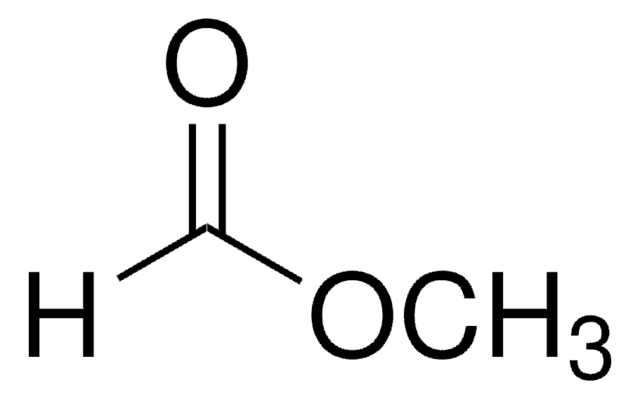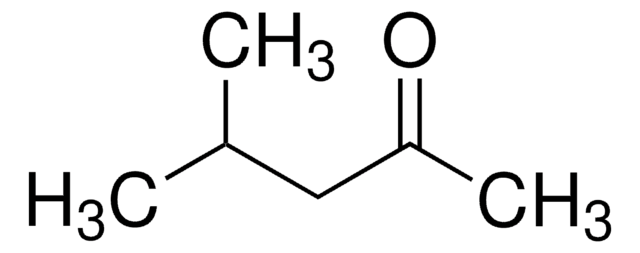About This Item
vapor density
2.55 (vs air)
Quality Level
vapor pressure
165 mmHg ( 20 °C)
assay
≥99.8% (GC)
≥99.8%
form
liquid
autoignition temp.
936 °F
shelf life
limited shelf life, expiry date on the label
expl. lim.
16 %
technique(s)
HPLC: suitable
impurities
≤0.05% water
evapn. residue
≤0.001%
refractive index
n20/D 1.361 (lit.)
n20/D 1.362
bp
57-58 °C (lit.)
mp
−98 °C (lit.)
density
0.934 g/mL at 25 °C
solvent strength ε (Al2O3)
0.60
λ
1 cm path, H2O reference
UV absorption
λ: 255 nm Amax: 1.0
λ: 275 nm Amax: 0.1
λ: 300 nm Amax: 0.01
SMILES string
COC(C)=O
InChI
1S/C3H6O2/c1-3(4)5-2/h1-2H3
InChI key
KXKVLQRXCPHEJC-UHFFFAOYSA-N
Looking for similar products? Visit Product Comparison Guide
Related Categories
Application
- Agglomeration of celecoxib by quasi-emulsion solvent diffusion method without stabilizer: effect of good solvent.: This research explored the agglomeration of celecoxib using the quasi-emulsion solvent diffusion method, highlighting the role of methyl acetate as a good solvent to improve particle size and distribution without the need for stabilizers (Maghsoodi & Nokhodchi, 2018).
- Formulation and in vitro evaluation of ketoprofen in palm oil esters nanoemulsion for topical delivery.: The formulation and evaluation of ketoprofen in a nanoemulsion system for topical delivery were examined, with methyl acetate used as a solvent to enhance solubility and stability of the active ingredient (Sakeena et al., 2010).
- Preparation of surfactant-free nanoparticles of methacrylic acid copolymers used for film coating.: This paper presented a method for preparing surfactant-free nanoparticles using methyl acetate as a solvent, emphasizing its role in the formation of uniform nanoparticle dispersions for coating applications (Nguyen et al., 2006).
signalword
Danger
hcodes
Hazard Classifications
Eye Irrit. 2 - Flam. Liq. 2 - STOT SE 3
target_organs
Central nervous system
supp_hazards
wgk_germany
WGK 1
Certificates of Analysis (COA)
Search for Certificates of Analysis (COA) by entering the products Lot/Batch Number. Lot and Batch Numbers can be found on a product’s label following the words ‘Lot’ or ‘Batch’.
Already Own This Product?
Find documentation for the products that you have recently purchased in the Document Library.
Customers Also Viewed
Articles
Butyl methyl ether; Acetic acid; 2-Butanone; Ethyl acetate; Tetrahydrofuran; 1-Butanol; Isopropyl acetate; Heptane; Propyl acetate; 3-Methylbutanol; 4-Methyl-2-pentanone; Isobutyl acetate; Butyl acetate; Dimethyl sulfoxide; Anisole; Cumene
Protocols
-Cymene; (−)-Menthone; α-Terpineol, natural, ≥96%, FCC, FG; Terpinolene; β-Bourbonene; 1-Octen-3-ol; β-Caryophyllene; Linalool; α-Terpinene; (−)-Menthol
Separation of Acetone; Acetic acid; Propionic acid; Ethyl butyrate; Ethanol; Isoamyl acetate; Isobutyric acid; 3-Methyl-2-butanol; Methyl acetate; 1-Propanol; Acetal, ≥98%, FG; 2-Methyl-1-pentanol; Butyl acetate; Ethyl propionate; 3-Pentanol; 2-Pentanol, 98%; Ethyl isobutyrate; Isobutyl acetate; Acetaldehyde; Furfural; Butyric acid; Methanol; Ethyl acetate
Protocol for GC Analysis of Class 3 Residual Solvents on SUPELCOWAX® 10
-Cymene; 2,5-Dimethylpyrrole; Acetoin, ≥96%, FCC, FG; 2,5-Dimethylpyrazine; 2,6-Dimethylpyrazine; 2-Ethylpyrazine, ≥98%, FG; 2,3-Dimethylpyrazine; 4-Heptanone; 3-Ethylpyridine; 2,3,5-Trimethylpyrazine; Furfural; Pyrrole; Furfuryl acetate; Linalool; Linalyl acetate; 5-Methylfurfural; γ-Butyrolactone; 2-Acetyl-1-methylpyrrole; Furfuryl alcohol; 2-Acetylpyrrole; Pyrrole-2-carboxaldehyde
Our team of scientists has experience in all areas of research including Life Science, Material Science, Chemical Synthesis, Chromatography, Analytical and many others.
Contact Technical Service


